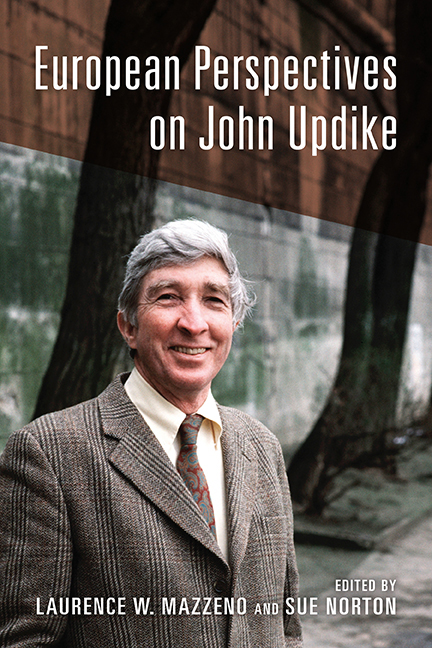Book contents
Introduction: Updike as Europeans See Him
Published online by Cambridge University Press: 15 August 2018
Summary
SINCE 1957, EUROPEAN READERS, reviewers, and critics have enjoyed an ongoing relationship—perhaps best described as a love-hate relationship— with John Updike's fiction, poetry, and essays. Updike was one of the writers fortunate enough to be noticed on both sides of the Atlantic early in his career. His inaugural publication, a collection of poems titled by his British publisher Hoping for a Hoopoe, was reviewed in the Times Literary Supplement (TLS). Notices of his first novel, The Poorhouse Fair, appeared in TLS, the Spectator, and New Statesman. One might attribute such early notoriety to Updike's having been affiliated with major American publishing houses (first Harper, then Knopf) that had standing agreements with European partners. It's unlikely, though, that he would have continued to receive such wide attention had Europeans found his work lacking in either style or substance. In fact, for the next half-century, his novels, short story collections, and even volumes of collected essays generated extensive commentary in major UK newspapers and journals. Additionally, while one might expect to find a large number of reviews in English, Irish, and Scottish publications, Updike's work was reviewed regularly in France, the Netherlands, Spain, Portugal, Germany, Italy, Sweden, Denmark, Switzerland, and Austria. Updike also developed a loyal readership in Eastern Europe; reviews and scholarly critiques appeared in Romania, Czechoslovakia (later in the Czech Republic), Hungary, Yugoslavia, and (later) Serbia.
Almost as quickly, European critics were contributing to the fastgrowing body of Updike scholarship. For example, Updike's 1963 novel The Centaur became the subject of articles published in Germany (Haas 1967, Seelbach 1970, Heuermann 1988), France (Terrier 1975), Czechoslovakia (Stehlikova 1978), and Portugal (Funck 1986). The Rabbit novels generated even more interest. Between 1957 and 2009, Updike's writing was the subject of dozens of articles and chapters by European scholars publishing in European and American journals. Among the more notable studies, the British scholar Judie Newman's 1988) monograph John Updike in Macmillan's Modern Novelists series has become an indispensable guide to the early fiction.
- Type
- Chapter
- Information
- European Perspectives on John Updike , pp. 1 - 10Publisher: Boydell & BrewerPrint publication year: 2018



